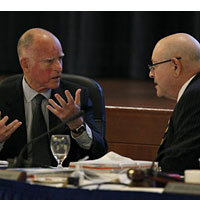Brown makes sure UC regents on right path

By Nanette Asimov
Gov. Jerry Brown made a rare appearance at the University of California regents’ meeting in San Francisco on Wednesday, not merely to bask in praise for his university-friendly tax hike just approved by voters, but to cast a frugal eye over UC and see that it’s spending money wisely.
The governor enlivened the normally soporific meeting of the finance committee by challenging university officials to explain and defend their spending practices, sometimes pushing them to do better.
When Peter Taylor, the chief financial officer, talked about debt management, Brown asked why debt had lately doubled. He said he wanted to know “in the context of keeping fees down,” a hint that more money could hinge on Taylor’s answer.
When Taylor presented slides on UC’s cost-cutting program, “Working Smarter,” and said it would save $500 million, Brown drilled down. “Could you explain that pie chart?” he asked. “I don’t notice anything in the chart that might go to the productivity of the university.”
Then, when Provost Aimee Dorr revealed that money-saving online courses were “slower to develop than anyone would like”- prompting complaints and finger-wagging from the regents – Brown said the regents need to get more aggressive about pushing for progress. “Not in the gilded tones of academia,” he warned. “But in the harsh reality of the marketplace.”
He said they should invite Udacity, a free online course developer, to visit. And he got the regents to agree to hold a special meeting in January just to move the project along.
Budget questions
Behind the tense but friendly colloquy – including a wrangle between Brown and UC Berkeley Chancellor Robert Birgeneau, who said UC’s online program is better than it looks – were looming questions over budget and tuition.
Brown’s visit came as the university threatened to raise tuition next year unless the state gives it another $126.5 million. Proposition 30, approved last week, protects UC this year only, ensuring that the current budget is intact and that students avoid higher tuition for the first time in six years.
On Tuesday, Brown got the regents to table a vote on fee hikes proposed for some groups. The vote could have sent fees soaring for students seeking professional degrees, a questionable political move just after voters agreed to raise taxes to protect students from such a fate. But those fees usually rise each year, so it may be just a matter of time before the proposal comes back.
Looking ahead, UC wants Brown and the Legislature to again shield students from a tuition hike next year – and to give UC the money it needs to get back on its feet.
Decline in quality
After cutting nearly $900 million dollars since 2008, UC President Mark Yudof said, quality has declined: Classes are bigger, faculty fewer, and services diminished.
He wants to boost spending next year by $584 million: adding to the retirement fund, giving raises, increasing academic help for undergrads, and more. And he wants the state to help out with a funding increase of $150 million, plus a $126.5 million tuition buyout. Without it, the price for a year at UC could rise yet again, by 6 percent.
Since Prop. 30 rescued UC from an automatic cut of $250 million, “We’re in a much better place,” Yudof said. “But it’s not a perfect place. We don’t want to increase tuition next fall. To make that possible, we need an arrangement. That’s the task ahead of us.”
Brown made no promises, despite news that California’s budget gap is estimated at less than $2 billion through June 2014 – a pittance compared with the usual double-digit gaps.
“It’s very challenging,” Brown said of pending budget negotiations with lawmakers. “It’s (preserving) tuition or it’s reducing child care or aid to the elderly.”
During a break, he reflected on his back-and-forth with UC officials.
“It was good and productive,” Brown declared. “The exchange was healthy – and I’m an optimist.”
But he refused to say whether what he had learned of UC’s efforts to cut costs and raise funds from private donors had persuaded him to reward them with additional funding next year.
[Source: SF Gate]


